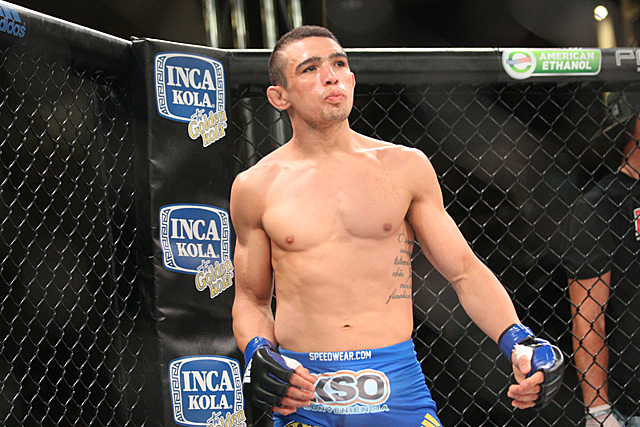The theory of a capitalist free-market system in economics operates under the presumption that every single person in an economy has the opportunity to succeed as much as the next. In a perfect free market, there are no advantages for anybody, even if it comes from having more money or higher stature. Also, every company that hires employees is given the chance to be successful, and if they fail to reach that level of success, they will have to fix their mistakes or accept failure.
The world of mixed martial arts is obviously not structured the same as a capitalist economy. There is no way it’s fair if the UFC has more of an opportunity than any other organization to sign certain fighters. If a company wants to go after a certain fighter, it should be allowed to make its best attempt at persuasion to get them to fight for the organization. If the smaller organization isn’t able to keep that fighter, that’s its own fault.
After Leandro Higo, who competed on The Ultimate Fighter: Brazil 4, recently signed with Bellator, being nabbed away fromthe Legacy Fighting Alliance, a little debate started brewing about whether the Viacom-owned organization should be recruiting fighters from smaller organizations, which already don’t have a lot of big-name stars on their rosters.
The answer to that question is simple: yes, they should.
If an organization wants better fighters competing for it, then the organization should be more than welcome to sign them. As long as they’re doing it legally and not violating any contractual agreements, then they’re perfectly within their rights. This is the free-market system of MMA: You get to sign whomever you want, within legal bounds.
Does it hurt smaller organizations, like the LFA, to lose someone like Higo? Of course. However, the smaller organizations shouldn’t be given a break by the bigger ones just because it can’t keep certain fighters on the roster. If those fighters want to compete somewhere else, they should be more than welcome to do so once their contract with their employer is finished.
Unfortunately, the smaller organizations are continuing to get the shorter end of the stick. These promotions aren’t able to employ the best fighters. They can’t keep up in terms of competition or salary. However, just like any other company out there in the free market, these organizations must grow and improve to attract better employees who can perform and help the company make a profit. That’s how capitalism works. In a lot of ways, it’s sink or swim, which many MMA organizations are beginning to realize. It’s not an easy business.
That’s the free market, though. You join a company, you perform well, you get compensated and the employer is successful. If you don’t perform well, you get fired and someone else might want you, or maybe nobody does. It’s all up to what you have to offer.
Now, if people want to debate the low level of wages fighters currently receive, that’s a separate conversation, but a very important one. Many would argue that pay is already pretty low in the UFC, where a low-level or mid-level fighter might make about $10,000 to $20,000 per fight. If it’s this low in the biggest fighting organization, then one can only imagine that it’s even worse in the smaller ones. Everybody has to start somewhere, though, and if you have to get low wages, that’s the imperfect free market at work.
Union organizing and putting pressure on fight organizations to pay more would be highly beneficial, but it seems like the level of sway the union movement has right now is limited. Granted, it’s growing, but it doesn’t have very much clout at the moment. Luckily, a lot of big name fighters, many of whom were formerly in the UFC, are pushing for a union for fighters, but people are still trying to decide which union is the best one for them. There’s also the possible implementation of the Muhammad Ali Act, which is something I covered at great length in a June 2016 article.
The philosophy of a free-market system in MMA, and the forming of fighter unions along with it, will create a very fair system for everyone. It’s not always going to be perfect and there are always going to be situations where the smaller companies lose the few remaining great fighters they have on their rosters, but if they put together a great team of executives to build a great company, they will be successful, just like the UFC. As unfair as things may be, it’s not the job of the system to help the company, but for the company to help itself by running a great business.
If it can happen in the traditional business community, it can happen in MMA just as well.

